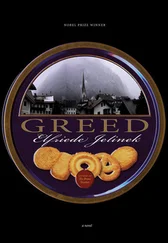Elfriede Jelinek
Wonderful Wonderful Times

Originally published in German in 1980 as Die Ausgesperrten
Translated by Michael Hulse
ONE NIGHT AT the end of the fifties an assault is committed in the Vienna municipal park. The following persons all grab hold of one solitary man out walking: Rainer Maria Witkowski and his twin sister Anna Wit-kowski, Sophie Pachhofen (formerly von Pachhofen), and Hans Sepp. Rainer Maria Witkowski was named after Rainer Maria Rilke. All of them are about eighteen, Hans Sepp is a year or so older than the others, though he too is without a trace of maturity. Of the two girls, Anna is the more ferocious, which can be seen in the fact that she pays most attention to the face of the subject. Particular courage is required if you are to scratch a man's face while he is looking full in your own (though he cannot see much since it is dark) or indeed try to scratch his eyes out. For the eyes are the mirror of the soul and ought to remain unscathed if at all possible. Otherwise people will suppose the soul is done for.
Anna (of all people) really ought to leave this fellow alone, because his character is better than hers. Because he is a victim. Anna is one of those who perpetrate wrongs. The victim is always better because he is innocent. At this time, of course, there are still a good many innocent perpetrators. With their wartime memories, their souvenirs, they stand gazing into the audience from windows bright with flowers, all friendliness, waving, or else they are in high office. With geraniums. Forgive and forget the whole lot, is what they say, so a completely new start can be made.
Later (when everyone always knows better) it turns out that the victim was an attorney working for a medium-sized company. The victim was a man who felt totally at home in a household that was kept neat and orderly down to the very last detail, which is something Anna reserves a particular contempt for. Cleanliness goes against her grain. By nature she is extremely unclean both within and without.
The youngsters appropriate the man's wallet. This notwithstanding, he is badly beaten up.
Anna bashes away regardless, thinking: How good to find somewhere to get rid of this powerful hatred of mine at last without having to turn it upon myself, which would be quite the wrong place for it. The money is useful too. I hope there's a lot in the wallet (it turned out to be on the average side). Hans also punches away with those fists of his, fists accustomed to manual work. As a man, he keeps to male ways of playing the game of violence: punches and treacherous, pile-driving headbutts. He leaves the universally notorious kick in the shins to Sophie, who avails herself of it time and again. Like two pistons of a complicated machine, thrusting alternately. It looked as if you just didn't want to get your fingers dirty and were leaving it to your feet, Rainer tells her later, taking her tenderly in his arms. Only to recoil promptly with a smothered, poisonous cry when she kicks him in the kneecap. She won't have that kind of thing.
Rainer, who sees himself as Sophie's one and only boyfriend (which was why he took her in his arms, after all), claws at the victim's clothing in quest of the wallet and cannot find it at first (but eventually does). Then he drives his knee into the belly of the man, who is hardly putting up any defence any more, and there is a gurgle and some slobber dribbles from the mouth. There was no blood to be seen because it was too dark.
That's brutal violence against a defenceless person, and quite unnecessary, declares Sophie, and she pulls with an audible tearing sound at the hair of the man lying in an untidy heap on the ground.
What's unnecessary is best of all, says Rainer, who wants to go on fighting. We agreed on that. What's unnecessary-that rather than anything else-is the principle at stake. But I think what's necessary is even better, says Hans, who (oddly enough) loves money, and he eyes the wallet. Money is unimportant, snaps Rainer, spraying the wallet with spittle, what do you think, are those notes hundreds or thousands?
Money isn't our guiding principle, says Sophie in her shimmering fashion. Her parents have a great deal of it, and prosperity has made her wayward.
Hans, the sweat flying from him, is still pounding away at the victim like some mindless machine that destroys the spirit in others. That is how the brother and sister see him: as a machine. Anna has been feeling all along that it's a beautiful machine, and Sophie will soon be thinking so too. There may be a seed of discord in this. Hans's fists thump down like hammers and only draw for further blows. Ouch, groans the victim softly, but hardly has the strength to say even that. And then: Police! But no one's listening. Anna takes this as a reason to kick him in the balls, since she is against the police on principle, as anarchists always are. The man maintains a frightened silence, curls up, and rocks about a little till at last he lies motionless and stays that way. Anyway, they've already got the money.
Anna prises Hans (who is thrashing about wildly) off the attorney and drags him away. It is time to make their getaway. People out for a walk can be heard approaching. What are they doing here at this late hour? The very same thing will happen to them one day.
The mouths of the grammar school kids and the worker are producing whistling sounds as they turn at a trot into Johannesgasse and hurry past the Vienna conservatoire, where a flurry of wind and string can be heard (and where Anna takes piano lessons). Orchestra rehearsals, which are always scheduled late so that people who work can take part are in progress. The Kartnerstrasse will be best now, with its busy multitudes, pants Sophie, so we can hide amidst the crowd of nighttime people that one finds there. There isn't a crowd on earth that we can hide in (Anna), because we stand out from the masses wherever we may be. The point isn't to hide but to do it openly, because that way we assert our principles of random violence to all comers (Rainer). Jerk (Hans).
Anna does not say anything else. Instead she thoughtfully licks salt from the victim's sweat and blood from the scratches scored by the victim in her right hand, the hand that was doing the hitting, and Rainer gives her an approving look, Sophie is mildly revolted, and Hans is impelled to slap her fingers. Scumbag.
There is so much pent-up rage in Anna (probably resulting from problems caused by the generation gap) that what she would like best of all would be to smash the bright windows along Vienna 's shopping boulevard. She would absolutely adore having the things in those shop windows but her pocket money won't run to it. Which is why you have to earn a little extra in this way. She is invariably consumed with envy if one of the other girls at school turns up wearing a new two-piece outfit with a white blouse, or new heels. All she says, however, is: It makes me want to throw up when I see those bints tarted up like that. Look at them in their half-wit togs, superficial, not two thoughts to rub together. She herself only wears dirty jeans and outsize men's pullovers, to make a statement about her attitude. The psychiatrist she has to see on account of a recurring inability to speak (an inability which afflicts her out of the blue and then vanishes without trace) is forever asking: Tell me, my dear girl, why don't you get something nice to wear and have your hair in curls, basically you're a pretty lass and you ought to be taking dancing classes. Just look at you, you give a young lad the creeps.
As for Anna, everything gives her the creeps.
Читать дальше













